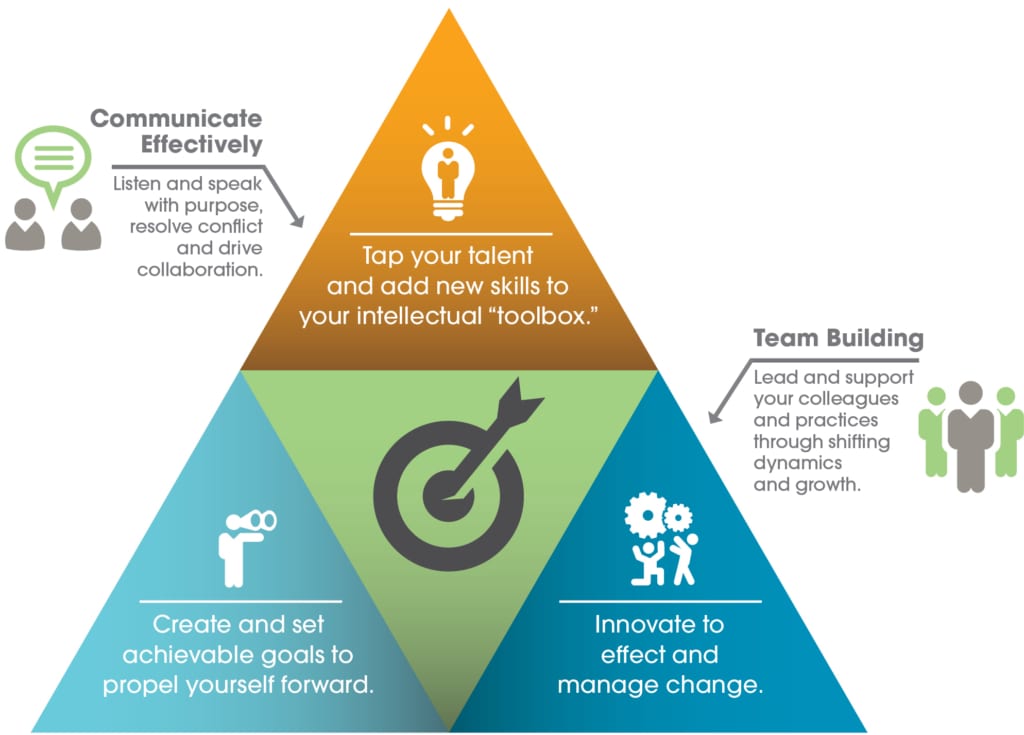The College’s Leadership Summit offers a unique opportunity for young members (under the age of 45 or within the first 10 years of practice) to grow in their leadership capacity. The event is held over a weekend (typically in March) where 20 aspiring leaders come to together to gain skills they can immediately put into practice and learn how they can be more involved with the College.
Successful completion of this program satisfies the ABAI MOC Part 4: Practice Assessment/Quality Improvement requirement (Alternative Modules).
Program Overview
The Leadership Summit covers topics like communicating effectively, preventing and dissolving conflict, advocating for change, improving coaching skills, discovering different behavior styles and much more.
“The Summit exceeded my expectations. It provided me with real tools to improve my leadership skills and interpersonal communication in my practice, in the ACAAI, and in my personal life.”
– Previous participant

Schedule at a Glance
(Subject to change.)
College 101 – Learn about the history of the College and the specialty, the role your predecessors have played in advancing health care, the foundations of governance, ethics and mentoring, and the importance and privilege of the role you could assume as a possible future leader.
Advocating Effectively – As a leader in your specialty, you represent the future. Be prepared to effectively advocate for the future and represent your specialty with training in public policy reform, best practices for engaging and influencing the public and policy makers, and key skills to become an effective champion of the specialty.
Changing the Mind’s Blueprints & Habits – Neuroscience shows us that our brain’s command center guides our attitudes and actions. Thankfully, we also now know that we can change the way our neurons and dendrites wire and fire (neuroplasticity). We discuss these insights for greater understanding of the internal dynamics of those we lead and co-work with.
Overcoming Limiting Beliefs & Practices – We explore how the human mind works while taking in information, forming stories and beliefs about what we see, hear and experience, and how that becomes part of the subconscious (but still operates below the surface). Those beliefs still guide how we respond to others and establish automatic practices that may or may not work for current situations and solutions.
Becoming More Responsive – Lack of responsiveness decreases trust and morale. It also limits how much valuable information a leader or team member acquires for decision-making and problem solving. We explore many ways to increase participant’s responsiveness with their team members.
Exploring the Influence of Positive Communication – No matter how good a communicator a leader or team member is, we hold that every one of us can improve this huge field of skills. In total, we cover an overview of the interrelated skills and awareness points involved with behavior styles, paraphrasing for clarity, asking powerful questions, conscious listening, empathizing for bonding, and distinguishing subjective from objective communication (separating fact from fiction).
Preventing & Dissolving Conflict – Disagreement between and amongst people is inevitable. But combat is optional. We explore the many causes of conflict, the tried and true methods to deal with conflict, and how to add to our skill set and insight areas for reducing friction and therefore ineffectiveness with others.
Improving Developmental Coaching Skills – Developing your own leadership skills and those of team and committee members’ skills is an essential part of creating high functioning teams. The program delivers a highly organized set of actions to take and how to implement them for best results. Participants engage in an experiential role play using the principles and practices.
Demonstrating Courage in Interactions – Every human being, especially leaders and including team members, have fears. Fear often holds us back. That is not a good thing for leaders responsible for getting work done with team members. Our exercises are designed to get participants in touch with their courage to move through or overcome fears. Attendees discover that they have more strength to overcome fears when in difficult situations than they have previously known or used.
Effective Committee Work – How effective committees work and how to be an effective individual committee member will be covered with real life practical application of these elements.
“I am so impressed with the quality of the tools and knowledge gained through the meeting. I also loved meeting so many great people from around the country.”
– 2024 Summit Participant
Ready to join us?
Reach out to Kate Barcal, ACAAI Associate Executive Director,
to see if this might be the right opportunity for you.